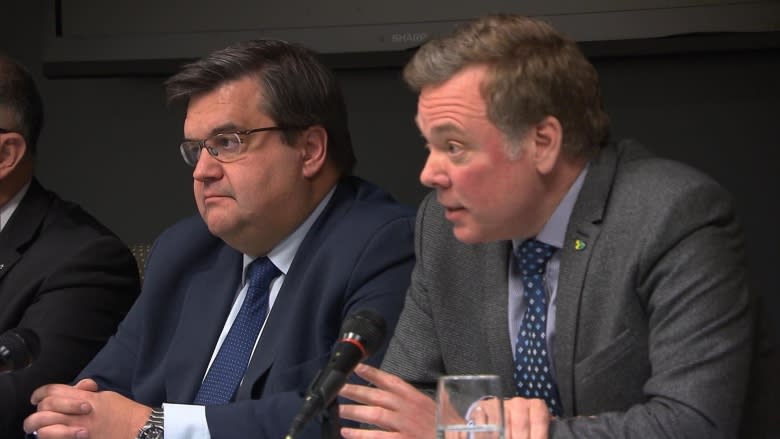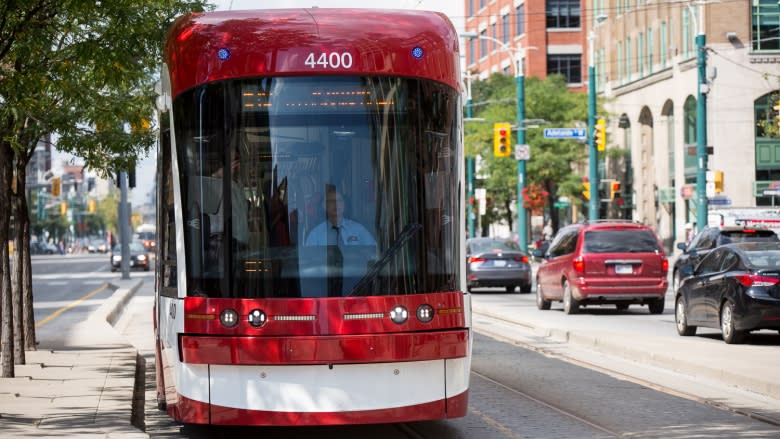What we know about the problems with the AZUR Metro cars
The rollout of Montreal's new Metro cars has been stopped in its tracks, literally, following a weekend malfunction on the Orange line.
On Monday, the STM, Montreal's public transit agency, said they've decided to temporarily pull all 12 of the new AZUR trains from service pending an investigation into the incident.
Here's what you need to know.
What happened?
The STM says that signaling equipment at the Du Collège Metro station was severely damaged when a train passed through Saturday afternoon.
So severe was the damage that it caused a 10-hour shutdown of parts of the Orange line. It required urgent repairs to the track, and STM crews managed to restore service by Sunday morning.
According to the STM's report, "an investigation is currently underway to determine whether the damages stem from a fault in the interface between trains and tracks."
The STM released photos of the damaged contact shoe, inductive coils and gauge rods.
Are the new AZUR cars to blame?
Philippe Schnobb, the chairman of the STM, told CBC's Homerun that inspection crews realized there was a problem with the contact shoe in December, but they didn't know exactly why or where.
He specified that the issue was not something specific to the AZUR cars, but that the effect of the problematic contact shoe was "worse" for the AZUR than the older Metro cars.
He explained that the STM plans to attach cameras to the underside of the cars, in order to pinpoint exactly where the contact shoe is malfunctioning.
He said these routine inspections take place every four to six weeks.
How will this affect the rollout of AZUR cars?
A total of 52 AZUR trains are supposed to be brought into service by 2018 and Schnobb says he's "confident" that they will make that deadline.
But this is not the first problem to surface in connection with the new cars.
Initially they were promised for 2014, but some Metro tunnels had to be widened in order to accommodate the bigger cars.
There was a further delay when Bombardier said in January 2015 that Alstom, its supplier, hadn't been able to deliver a key software component.
After months of delays, the AZUR trains were first put into service last February.
Then three AZUR trains were pulled out of service in June after a crack was found in a nut holding together one train's suspension system.
How angry should commuters be?
The STM says these kinds of mechanical issues are expected when it comes to phasing in a new fleet of cars.
Schnobb told reporters Monday that this "this happens everywhere in the world. And in some cities, it's much worse than what happened here."
Mayor Denis Coderre echoed these reassurances, saying that the city's Metro system has faced these kinds of issues before.
"The first MR-73, they had their issues too. Or the MR-65 the first time, because it was the first time ever that we had the Metro," Coderre said.
Is it Bombardier's fault?
Schnobb and the STM aren't willing to get into the "hypotheticals" of whether the issue lies with the AZUR cars, which we are made by a Bombardier-Alstom consortium.
"The assumption is that the problem is on the track, not on the train," Schnobb told CBC.
The $1.2-billion contract to replace Montreal's aging fleet of cars was awarded to Bombardier without a public tender in 2006.
The French-owned company Alstom later argued it should be allowed to compete for the lucrative contract as well, and two years later a Quebec Superior Court judge ruled in the company's favour, enabling it to bid on the contract.
Bombardier and Alstom went on to form a consortium in 2010, building a factory in La Pocatière, Que.
Toronto's transit agency wants to cancel its nearly three-quarter-billion dollar contract with Bombardier to supply light-rail cars. Metrolinx said it had "concerns about Bombardier's performance as there have been significant quality and manufacturing issues."
Meanwhile, 30 new Bombardier streetcars in Toronto are experiencing mechanical problems more often than expected, according to a report tabled last week.
The mechanical problems include doors that don't open properly, brake issues and intercom systems that don't work.
Bombardier refused an interview request Monday from CBC Montreal, directing questions instead to consortium partner, Alstom.
They rejected the suggestion there was a design problem with the AZUR cars.
"This is not an AZUR issue as the MR73 trains also have damaged equipment. Furthermore, the AZUR train's design has been validated by the STM, respects the STM's technical specifications, and the AZUR trains have travelled thousands of kilometres without any problems," Alstom said in a statement.




